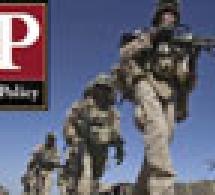 |
 |
Iraq's Fragile Transition
Just published yesterday at Foreign Policy Magazine is LTG James Dubik's latest commentary on the conflict in Libya.
In the piece Dubik argues that the Obama administration should prepare for the inevitable in Libya. To win this fight and prevent a coming anarchy, it's going to take alot more than a no-fly zone – it will take boots on the ground.
Read Boots on the Ground
“The way the United States and its allies have intervened in Libya has placed them on a dangerously slippery slope. Air power alone has not protected Libyan civilians, the declared objective in U.N. Security Council Resolution 1973, which authorized the military intervention. Nor have the rebels proved capable of making significant advances against Muammar al-Qaddafi's forces. To effectively enforce the Security Council resolution, the coalition would need to put combat air controllers, advisors, and trainers on the ground -- steps it appears unwilling to take. Where does that leave the coalition when it comes to developing a coherent war strategy? Mostly empty-handed.” – LTG James Dubik
ISW Events
With the deadline for full withdrawal of U.S. forces from Iraq swiftly approaching, now is the time to evaluate the role of a U.S. presence in Iraq after December 31, 2011.
Join ISW next Friday, April 15th as an expert panel addresses the issues facing Iraq and this fragile transition At the event we will hear from panelists Emma Sky, former political advisor to Gen. Odierno, Max Boot, Senior Fellow at the Council on Foreign Relations and Michael O’Hanlon of the Brookings Institution who will discuss the various issues facing Iraq and the U.S. as the December deadline approaches. ISW Senior Fellow and former Multi-National Security Transition Command-Iraq (MNSTC-I) Commander Lieutenant General James Dubik will moderate Friday’s discussion.
Topics will include-
• Will the U.S. force withdrawal undermine Iraq’s security?
• Is a follow-on agreement necessary?
• What are the broader military and strategic implications of this transition?
• Will a transition to a U.S. State Department presence be sufficient to continue U.S.-led training and counterterrorism assistance for Iraq?
“Iraq’s Fragile Transition”
Friday, April 15th, 2011
Time: 11:00 am–12:30 pm
Location: Reserve Officers Association (ROA)
One Constitution Avenue, NE
4th Floor
Washington, D.C. 20002
Please RSVP via Eventbrite by April 13th
Commentary
The CTC Sentinel, a publication from the Combating Terrorism Center at West Point, recently published "Haqqani Network Influence in Kurram and its Implications for Afghanistan,” by ISW Senior Analyst Jeffrey Dressler. His report highlights the strategic significance of the Kurram region and the ways in which the lethal Haqqani Network increases its influence there by exploiting sectarian tensions.
"Recent Haqqani interference in Kurram and the network’s brokering of a peace deal between long-feuding Sunni and Shi`a tribes in the region have important implications for U.S. efforts in eastern Afghanistan, the Haqqani network’s ties with al-Qa`ida-affiliated groups, and the international community’s tenuous relationship with Pakistan."
Read "Haqqani Network Influence in Kurram and its Implications for Afghanistan"
Be sure to visit www.understandingwar.org for the absolute latest from the conflict in Libya, including our daily Libya Conflict Situation Update Tracker and continuing commentary from ISW staff.
